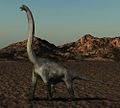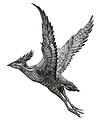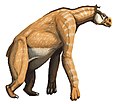User:Mitternacht90/Extinct
| Extinct Animals Temporal range: Ediacaran - Recent
| |
|---|---|

| |
| Just an amazing picture!! :O 10/10 | |
| Scientific classification | |
| Kingdom: | |
| Phylum: | |
| This is a Wikipedia user page. This is not an encyclopedia article or the talk page for an encyclopedia article. If you find this page on any site other than Wikipedia, you are viewing a mirror site. Be aware that the page may be outdated and that the user in whose space this page is located may have no personal affiliation with any site other than Wikipedia. The original page is located at https://en.wikipedia.org/wiki/User:Mitternacht90/Extinct. |
THANK YOU EVERYONE, EVERYONE IS A GOOD ARTIST. CHEERS! :D --HoopoeBaijiKite 23:54, 11 April 2008 (UTC)
- Discussion of this "Project".
- I've now let guests post, but please no rude comments. They'll be deleted immediately.
Please enjoy this selection of animals, it has taken me months to re-organize it and whatnot.
If there are any species I missed, please tell me, thank you! --HoopoeBaijiKite 16:23, 28 March 2009 (UTC)
Did you know?
[edit]I know this is random, but did you know? that:
- Gigantoraptor was found during my vacation a couple of years ago?
- I've found my own fossils in Arkansas?
- About eight species of valid dinosaurs were discovered in 1990, the year I was born?
- A dinosaur is named after my best friends last name? (Stokesosaurus)
- If I was to name a dinosaur, I'd name it Upupimimus ("hoopoe mimic"), a dinosaur found in made up country, Devonshire?
Animals
[edit]Images by Stanton F. Fink, Heinrich Harder, Mateuszica, Noles1984, DiBgd, LadyofHats, Bogdanov, Dinoguy2, Ghedo, Tim Bekaert, Steveoc86, ДиБгд, Marmelad, Jim Robins, FunkMonk, Jim Robins, Laikayiu, Dlloyd, Peter Norton, John Conway, Michael Reeve, Dantheman, Todd Marshall, Ballista, Debivort, Ghedo, John Conway, Smeira, Finblanco, Steveoc, Gerhard Boeggemann, Benosaurus, Matt Martyniuk, Esv, William Diller Matthew, Captmondo, Amos E. Wolfe, Mojcaj, Benjamin Chandler
BEING REDONE, BARE WITH ME!
Gallery of new species
[edit]Been a long time since I've added anything, so I think I might to make it a gallery now...
-
Adeopapposaurus, a prosauropod.
-
Aerosteon, an allosaurid.
-
Anchiornis, a maniraptoran bird!
-
Armadillosuchus, a crocodylomorph
-
Australovenator, another allosaurid.
-
Beishanlong, an ornithomimosaur.
-
Ceratonykus, an alvarezisaurid.
-
Darwinius, the missing link!!]]
-
Diamantinasaurus, a titanosaur.
-
Hesperonychus, NA's smallest dinosaur!
-
Keuppia, an octopus.
-
Maiacetus, a whale with a fetus!
-
Minotaurasaurus, an akylosaurid!
-
Miragaia, a long-necked stegosaur!
-
Nichollssaura, a plesiosaur.
-
Panphagia, the most basal known sauropodomorph!
-
Puijila, a really CUTE pinniped...
-
Qiaowanlong, a braciosaurid
-
Raptorex, a tyranniosaurid
-
Shanweiniao, a pretty bird. :P
-
Skorpiovenator, an abelisaurid!
-
Spinophorosaurus, a sauropod
-
Tianyulong, a weird Ornithischian with protofeathers!
-
Tianyuraptor, a dromaeosaurid
-
Wintonotitan, another titanosaur.
-
Xiongguanlong, a tyrannosaurid.
-
Zanabazar, a troodontid.
MISSING LINK FOUND!!!
[edit]Main article: Darwinius. See that page for references.
Darwinius is a genus of Adapiformes, a group of basal or stem group primates from the Eocene epoch. Its only known species is Darwinius masillae, dated to 47 million years ago (Lutetian stage). The genus Darwinius was named to celebrate Charles Darwin on his bicentenary and the species name masillae honors Messel where the specimen was found.
Reptiles
[edit]Reptiles, or members of the class Reptilia, are air-breathing, cold-blooded vertebrates that have skin covered in scales as opposed to hair or feathers.
Synapsids
[edit](NOTE: I made a simple mistake on the title of the article...)
Synapsids ('fused arch'), also known as theropsids ('beast face'), are a class of animals that includes mammals and everything closer to mammals than to other living amniotes.
Dinosaurs
[edit]Dinosaurs (Greek δεινόσαυρος, deinosauros) were the dominant vertebrate animals of terrestrial ecosystems for over 160 million years, from the late Triassic period (about 230 million years ago) until the end of the Cretaceous period (65 million years ago), when most of them became extinct in the Cretaceous–Tertiary extinction event. The 10,000 living species of birds have been classified as dinosaurs (q.v.).
Birds
[edit]Birds (class Aves) are winged, bipedal, endothermic (warm-blooded), vertebrate animals that lay eggs.
Fish
[edit]A fish is any aquatic vertebrate animal that is typically ectothermic (or cold-blooded), covered with scales, and equipped with two sets of paired fins and several unpaired fins.
NOTE: incomplete!
Tetrapods
[edit]Tetrapods (Greek τετραποδη tetrapoda, Latin quadruped, "four-footed") are vertebrate animals having four feet, legs or leglike appendages.
Mammals
[edit]Mammals (formally Mammalia) are a class of vertebrate animals whose name is derived from their distinctive feature, mammary glands, with which they feed their young. They are also characterized by the possession of sweat glands, hair, three middle ear bones used in hearing, and a neocortex region in the brain.
Invertabrates
[edit]Invertebrates are animal species that do not develop a vertebral column. This in effect includes all animals apart from the subphylum Vertebrata.
NOTE:INCOMPLETE
Other Life
[edit]If I have enough time, I might start this. It'll include plants, because I have no idea what the extinct fungi, bacteria, protists or virus, etc.








![Darwinius, the missing link!!]]](http://upload.wikimedia.org/wikipedia/commons/thumb/2/20/Darwiniusfig-s62cropped.jpg/85px-Darwiniusfig-s62cropped.jpg)








































































































































